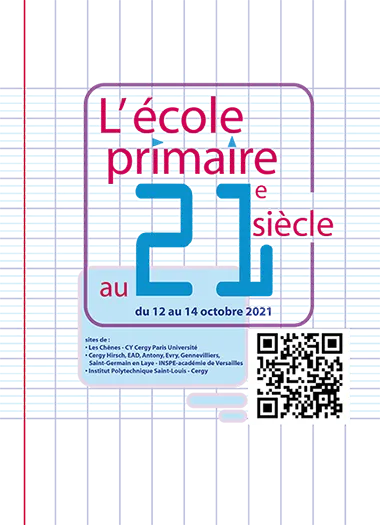Le colloque L’école primaire au 21ème siècle https://colloque-lp21.sciencesconf.org/ a eu lieu à Cergy du 12 au 14 octobre 2021.
Dans le cadre de l’Atelier « Dimension spatiale », axe 2 « Processus et dispositifs », l’équipe AQUAMARINE a présenté la suivante communication orale :
Auteurs Georgeta Stoica (CUFR Mayotte); Philippe Charpentier (CUFR Mayotte)
Cette communication a été présenté dans le cadre du Panel scientifique intitulé Environmental education for transformation :
Stoica, G., Tribollet A. (Convenors) (2022). Environmental education for transformation: you are never too small to make a difference. Scientific Panel organisé dans le cadre du Colloque International
17th EASA Biennial Conference Transformation, hope and the commons, Belfast 26-29 July 2023
Short Abstract:
This panel invites papers offering a critical examination of the environmental education practices, environmental awareness programs, Fridays for Future actions etc. We particularly welcome contributions on what we term « children empowerment » in the context of a fast-changing society.
Long Abstract:
Despite the « code red » warning from the last Intergovernmental Panel on Climate Change report, the Earth Summits conferences and the appearance of Anthropocene new geological epoch (Crutzen, 2002) few concrete initiatives and proposals for changes have been advanced by political representatives from different countries. It is in this context that a powerful voice appeared, that of Greta Thunberg at the Cop 24 United Nations climate change summit in 2018. The Greta Thunberg speeches have contributed to an increased awareness about environment and climate change in both children and adults. Her urgent call for actions has been sustained by millions of teenagers that support her in challenging political institutions and powerful personalities. All this in a context, where there is a need to empower future generations so that they can act and think critically about the accelerated changes (Eriksen 2016) associated with environmentalism and sustainability. Considering that environmental education (Kopnina 2012) is left at the margins of the teaching activities at the benefit of core subjects such as Literacy and Math and that children’s proposals are not taken seriously, this panel offers a critical examination of the environmental education practices but also of the actions that are happening outside of the school i.e. environmental awareness programs, scientific educational programs, Fridays for Future actions etc. We welcome empirically informed and/or theoretical discussions that address one or more of the following themes: youth activism and climate change, children empowerment and environmental governance, NGOs and environmental protection, environmental awareness and schools curricula.
Click here to see the accepter papers and visualize the panel video : https://nomadit.co.uk/conference/easa2022/p/11973

